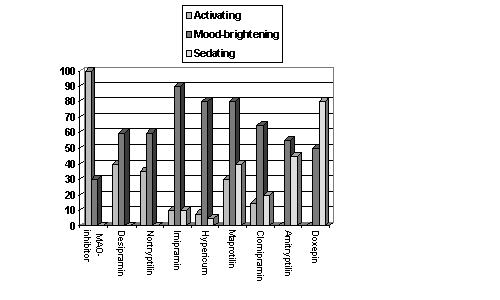
Study 24
The influence of St. John's wort on CNS activity
AU: Johnsson-D, Siebenhuener-G, Hofer-E, Sauerwein-Giese-E, Frauendorf-A
SO: TW Neurologishe Psychiatrie 6, 436-444, juni 1992
Effects on auditory and visually evoked potential and EEG were measured in 12 subjects during six weeks' treatment with Jarsin (0.37 mg x 3). After only two weeks, the phases were considerably shortened compared to the baseline values; this reduction reached its greatest extent after four to six weeks (11). This implies improved reaction time when treated with hypericum extract.
The subjects' ability to perform an attention test and the so-called Mackworth Clock (another cognitive attention test) showed statistically verified better results after treatment with hypericum.
The EEGs showed a typical antidepressant profile with an increase of theta and beta frequencies and a decrease in alpha frequencies.
The well-being scale showed a slightly better result in the trial group compared to the placebo group, although the subjects were not depressed or sick at the start of the study. There were no significant differences between hypericum and the placebo concerning self-rated judgement of effect.
The authors concluded that hypericum seems to have an activating effect on cognitive perception and reaction time and that it has no sedating effects. They compare the effect to that of Imipramine in the so-called Kielholz schedule, a schedule that classifies the different classic antidepressants regarding activating, antidepressive and sedating effects. See Figure 15.
Figure 15. Hypericums place in the "Kielholz schedule".

Copyright © 1996 by Harold H. Bloomfield, M.D. and Peter McWilliams
Disclaimer - Copyright - Contact
Online: buildfreedom.org | terrorcrat.com / terroristbureaucrat.com